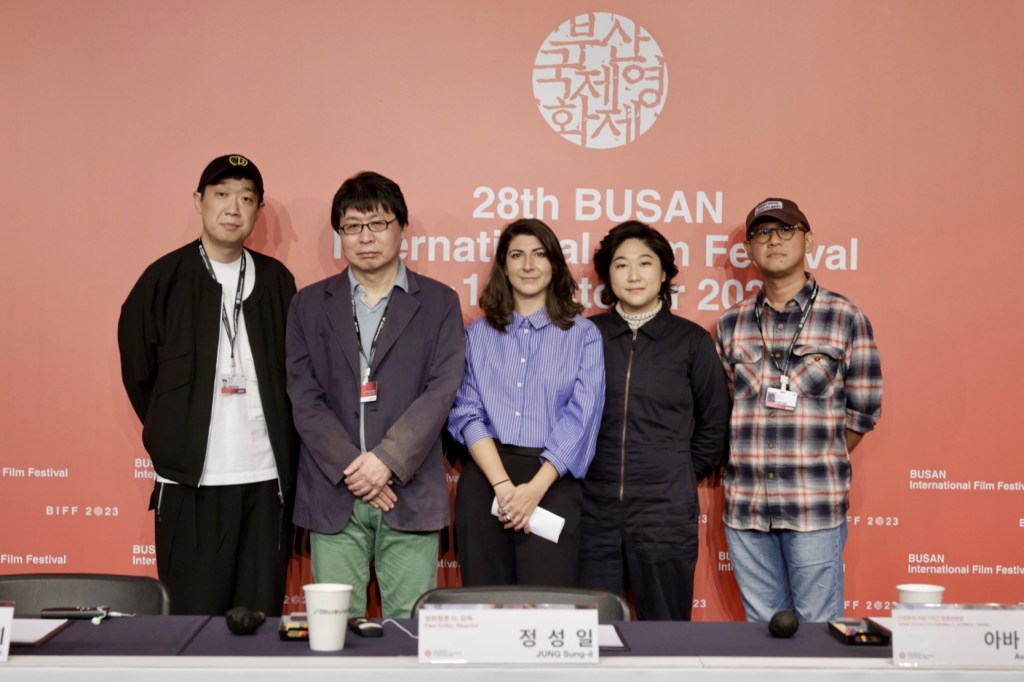‘Minari’ Producer & Busan Jury Member Christina Oh Talks Building Bridges Between U.S. And Korean Film Industries – Busan

In addition to her duties serving on the jury of Busan’s New Currents competition, U.S.-based producer Christina Oh will be meeting a group of Korean filmmakers at the festival to talk about upcoming film projects and attempt to build more bridges between the film industries of Korea and the U.S.
Speaking at the Busan New Currents jury press conference, Oh said she feels that opportunities are growing for filmmakers from Korea and other diaspora communities to make films in North America.
“With the success of films like Parasite, Minari and Past Lives there’s an interesting trend towards being more inclusive of films from, not just Korea, but other countries,” said Oh, a Korean-American producer who has credits including Lee Isaac Chung’s Minari and Bong Joon Ho’s Okja.
Related Stories

Busan Film Festival Back On Track With Star Power & Strong Line-up Following Management Turmoil

How Busan's ACFM Is Helping Producers Get An Early Jump On Hot IPs
While Minari was successful at the U.S. box office and won a best supporting actress Oscar for Youn Yuh-jung, Oh said it was actually Korea that was the highest grossing box office territory for the film. “Even though it’s an American film, albeit one with Korean as its primary language, it performed really well in Korea. So for me it was a realisation that you can make these sorts of bridge-building films.”
She added that Minari worked because the filmmakers didn’t intentionally set out to make a film that would bridge a gap. “We made it because me, Lee [Isaac Chung] and Steven [Yeun, star of the film] felt this push and pull of being American and also Korean, but not quite Korean enough, and not quite American enough. We hoped it would resonate with people and it did surprisingly well in Korea.”
Oh said she’s planning to watch around a dozen films from emerging Korean filmmakers during the festival, and then set meetings to see if they’re interested in co-production or other forms of collaboration.
She also said she sees potential among diaspora communities from other parts of Asia, as well as Latin America, Europe and indigenous filmmakers in the U.S.: “It’s an exciting time because it’s not just the filmmakers reaching out, but also the studios and the agents who are talking about what they’re looking for and excited about,” Oh said.
Busan is hosting a special programme, ‘Korean Diasporic Cinema’, which will screen six films, including Minari, Past Lives and Justin Chon’s Jamojaya, as well as hold public talk sessions with talent including Youn Yuh-jung, John Cho and Steven Yeun.
Oh is serving on a five-person jury headed by Korean critic and director Jung Sung-il and also including Korean director Han Junhee, Ava Cahen, artistic director of Cannes Critics’ Week, and Indonesian director Edwin. The New Currents competition comprises ten films from first and second time directors and this year includes new works from Korea, Japan, China, Thailand, Malaysia, India and Bangladesh.
All the jury members have attended Busan before, or have some prior connection to the festival, and said they value it as a destination to discover new filmmakers, as well as filmmaking trends from across Asia.
“This is my third time in Busan and every year I’ve felt the dynamics of the festival and the fact that you can see the future of the film industry here,” said Cahen. “You can meet buyers and producers but also new auteurs and filmmakers as well.”
Edwin said he’d attended BIFF’s Asian Film Academy (AFA) early in his career. “I made a lot of friends that I’m still in contact with at AFA. It’s not just the films that are shown at Busan, but also the network, the people, programmers and audience that are special for me.”
He added that it’s an interesting time to be serving on the Busan jury to get a sense of where Asian cinema stands after the disruptions of the past few years: “We’re in a different phase after the pandemic, so I’m curious to see what these new filmmakers share about how they feel. I think it’s also important to see the connections between films from different cultures and learn more about the identity of being Asian, or Southeast Asian.”
Must Read Stories
Warner Bros. Discovery’s Gerhard Zeiler Sets New Leadership Team
Pete Davidson, Bad Bunny Among Season 49 Hosts; New Castmember; Premiere Date
CAA Claims Ex-Client Asked For $15M Before Filing Weinstein Sexual Assault Suit
Ridley Scott, Michael Mann, Emerald Fennell & Many Others Set For London Event
Read More About:
Source: Read Full Article



